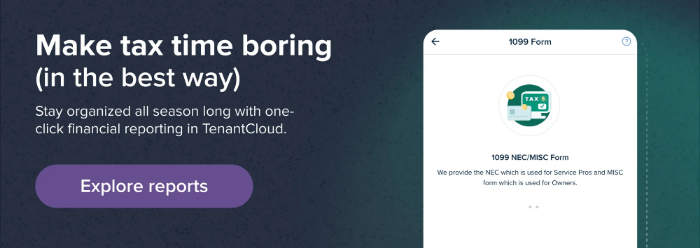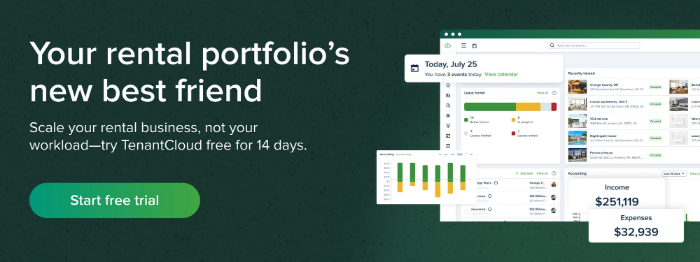As a new year approaches, it can only mean one thing (besides a sudden spike in gym memberships); we're that much closer to tax season. And whether you're dreading it or looking forward to it (hello, tax returns!), you want to save on operating expenses while keeping as much money in your pocket as possible this year.
On the plus side, it's nice to know that there are plenty of tax deductions for landlords to take advantage of and reduce their rental expenses. Some deductions are fairly straightforward, and others much more complex, but they're generally worth the effort you put in to qualify for them, especially if money is flowing out the door in other ways. Here are eleven deductions to consider in 2026 for your 2025 tax year:

1. Professional Service Fees
If you paid any fees to lawyers, tax accountants, real estate investment advisors, or other similar professionals for your rental properties—you're in luck. These services have tax benefits. If you hired a property management company, consulted with a lawyer about a tenant, or met with an accountant in 2025, don't forget to include this deduction.
2. Property Taxes
Even with the rise in mortgage rates in the last few years, the housing market has continued to soar. With rising home values, it's only a matter of time before local home appraisers set your property's value higher, which can be a good thing if you plan to write off your property taxes.
2026 Update: SALT Deduction Cap Temporarily Increased
Previously, the Tax Cuts and Jobs Act of 2017, limited the amount of state and local taxes you can deduct to $10,000 for single filers and married couples filing jointly and $5,000 for married couples filing separately. In 2025, the state and local tax (SALT) deduction cap—which includes property taxes—is temporarily increased to $40,000 for tax years starting in 2025 and gradually adjusted over the next few years before reverting back later.
Why it's helpful: The SALT cap is especially meaningful for landlords in high property-tax states like California, although the benefit phases down for higher-income taxes.
3. Interest
If you paid interest on loans used to fund your rental property, the interest for those funds are deductible. While you might already be familiar with mortgage interest deductions, another type of deductible interest that is not commonly known is credit card interest. You can deduct any interest you paid on credit cards used to purchase business services, materials, and supplies.
It's important to note that personal credit card interest is not deductible unless it's tied directly to purchases or services for your rental business.
4. Insurance
If you paid insurance premiums for insurance coverage on your rental properties, including liability insurance, mortgage, property, hurricane, fire, theft, or flood insurance, be sure to write these off so you can save more on your taxes. And if you have employees in your rental business, you can deduct their health insurance or worker's compensation insurance.
5. Depreciation
As a landlord, you can claim depreciation on the costs associated with your rental property business, which can help reduce taxable income in the short term. Some items—like the majority of the cost of purchasing your rental property or capital improvements—must be depreciated over 27.5 years instead of deducted. But there are some things you can depreciate at a faster rate, like new appliances in a rental unit (five years), office furniture and equipment (seven years), and fences (15 years). Be sure to talk to your tax accountant about these items since depreciation can be nuanced.

2026 Update: One Big Beautiful Bill Act - Section 179
For rental property placed in service (which means when it was available for rent) starting January 19, 2025, landlords and investors can take 100% bonus depreciation on eligible property.
Why it's important: This update allows business owners to write off a larger portion of costs upfront—in this case, the same year the rental property has been placed in service, instead of depreciating the costs over many years.
Typical items that may qualify for Section 179 (OBBBA) expenses include:
- Tangible personal property used in the rental business (security systems, HVAC)
- Office equipment and furniture
- Computers and business software (such as property management platform or rental income software)
- Business vehicles (set limits)
- Equipment used for business operations
Keep in mind that these qualifying items are for general business owners and not specific to landlords. Certain criteria will not qualify, such as the following:
- Residential rental property (focus on bonus depreciation and cost segregation instead)
- Air conditioning units
- Property acquired from relatives (family member purchases do not count)
- If the rental you own is not considered a business under IRS rules, you cannot claim business deductions
Learn more here.
6. Utilities
Are you paying for electricity, water, gas, or other utilities for your tenants? These are deductible expenses for your rental business. This deduction will be offset, however, if you pass these costs on to your tenant, so only claim what you're taking on yourself.
7. Repairs and Maintenance
The costs associated with repairing or maintaining your rental property can be tax-deductible so long as the actual expenses are related to the rental property and not capital expenditures.
This can get tricky, as sometimes it's hard to know if work on your rental property falls into the repair and maintenance category or the capital improvements category. A general rule of thumb is that if something you do restores your property to its original condition, it is a repair. (Upgraded the tile in your bathroom for aesthetics? Deductible, but not considered a repair or maintenance expense.) Regularly servicing and maintaining your rental property is also important to prevent things from becoming a problem. So be sure to deduct maintenance costs that regularly recur, like tree pruning, gutter cleaning, landscaping, HVAC maintenance, etc.
8. Capital Improvement
Beyond repairing and maintaining your property, you may also make a change to your rental property that significantly improves or extends the useful life of your property. This is considered a capital improvement. Other examples include renovations, completing the basement, bathroom makeovers, kitchen updates, and installations (new roof, HVAC system, etc). It also includes labor costs from independent contractors for repairs or updates—not only DIY projects are a tax deduction.
9. Home Office
While the Tax Cuts and Jobs Act of 2017 made it so work-at-home employees can no longer deduct out-of-pocket expenses, self-employed business owners can still claim the home office deduction for qualifying costs.
If you are a self-employed landlord and have a dedicated space in your home that you use only for your rental business, you can deduct an equal percentage of the space from your housing costs. With a dedicated home office, you may also be able to deduct local transportation expenses (auto mileage) to and from rental properties. If you do not have a home office, a trip from your home to your rental would be a non-deductible personal expense.
10. Travel Expenses
As mentioned above, mileage spent traveling to and from your rental properties can be deducted if you have a dedicated home office, so be sure to document how many miles you drive and what each trip was for (e.g., showing the property to prospective renters, meeting a contractor, picking up needed supplies). You can also deduct long-distance travel, but you need to be able to prove the travel is mainly for business purposes.
Important note: Property owners must be tied to a home office and legitimate travel reasons to be eligible.
11. Meals
If you are traveling to a property you already own and get some food on the way, you can deduct 50% of the cost of that meal. It might seem tedious to keep documentation on every purchase, but you can easily store your expenses in TenantCloud's tracking tool. It's important to keep detailed documentation of your deductions in case you are audited down the road.
As always, consult a tax professional before taking these deductions to be sure you understand their nuances. A professional can help you figure out if you qualify for a deduction, or they can help you build a defensible case for taking certain deductions. Nobody wants to be audited by the IRS. If you are, though, be sure you are prepared.
More Tax Deductions for Landlords
Many rental property owners and real estate professionals are utilizing tax benefits known as a 1031 Exchange. A 1031 exchange allows you to swap a real estate investment property for another like-kind property to defer capital gains taxes, often called “trading up.”
While you'll need to pay taxes at some point down the road, except in cases of inheritance, this allows you to use the entire proceeds of a sale to purchase a new property right away. You can thereby increase the size of your portfolio at a faster pace than would otherwise be possible if you were paying capital gains taxes upon each sale.
It's important to note that 1031 exchanges have a strict timeline that must be followed and generally require the assistance of a qualified intermediary (QI).
File Taxes with Confidence
From organizing receipts to downloading tax reports, TenantCloud makes it easy for you to be ready for tax season at the touch of a button. Try TenantCloud today and start managing properties like a pro.
*TenantCloud are not tax experts. Please consult a tax professional for advice based on your rental business.








